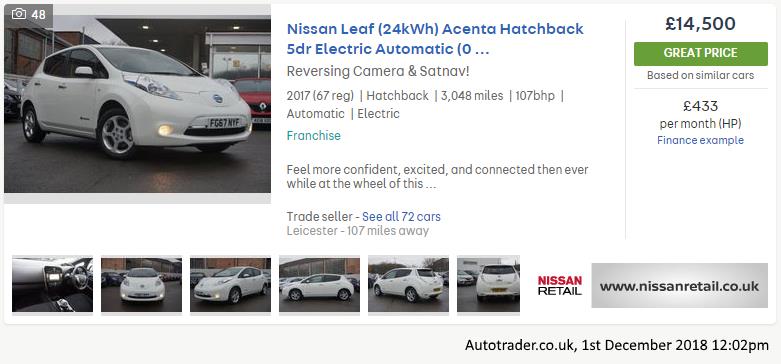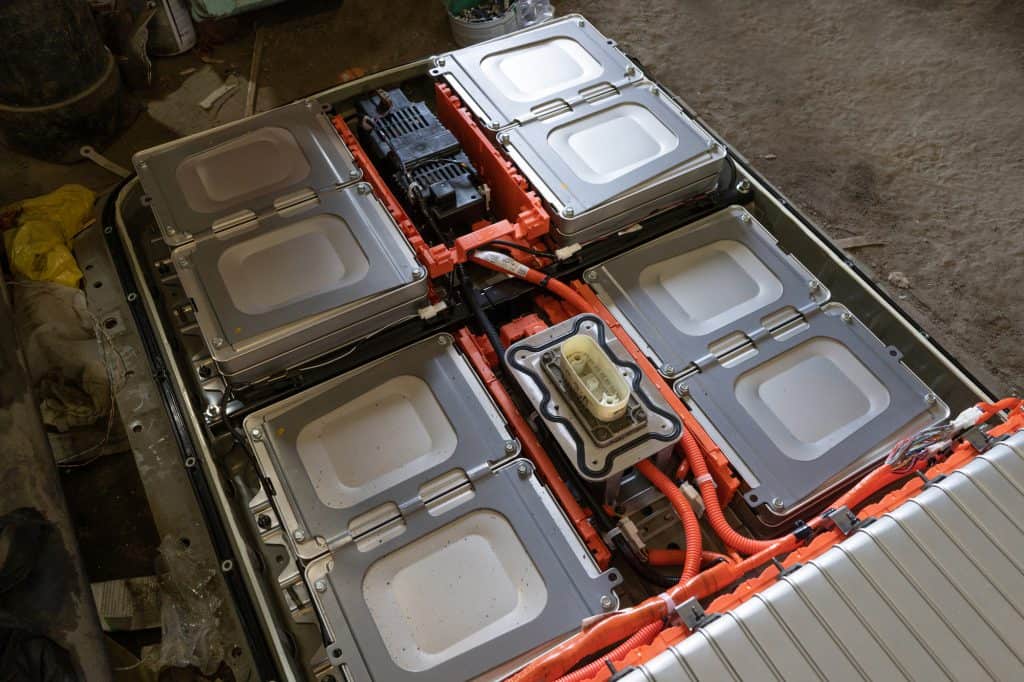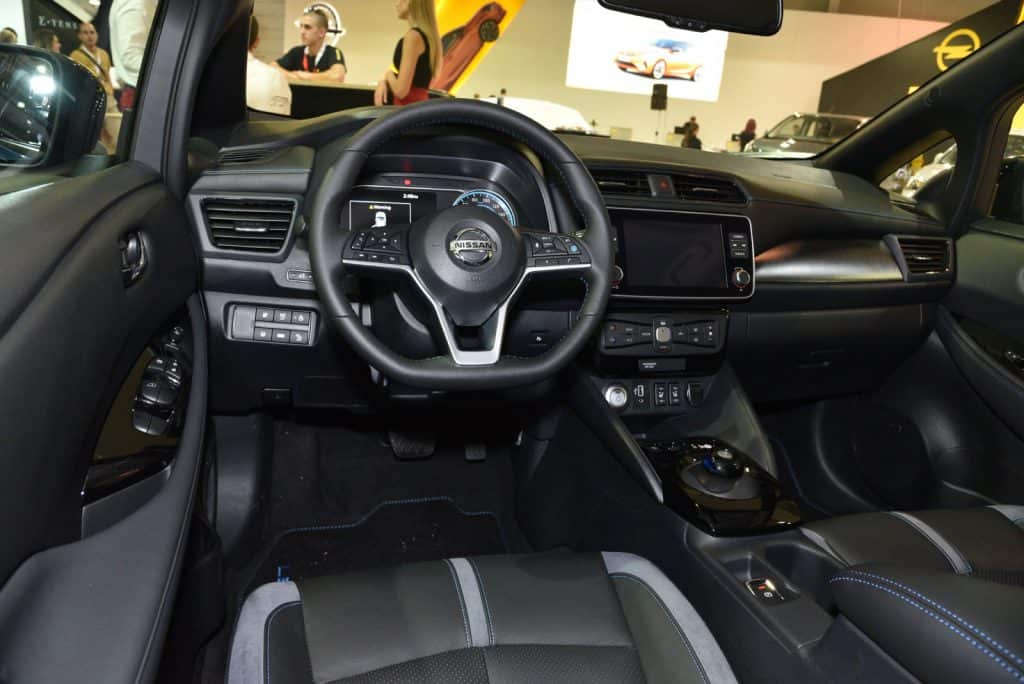Have you ever been in the market for a used Nissan Leaf? Were you immediately taken aback by how affordable they were? This is a phenomenon on the minds of many existing and aspiring EV drivers and fans. In today’s blog, we’ll be exploring the world of used Nissan Leafs and what the factors are that explain their relatively low prices.
Buying a Nissan Leaf
The brand-new 2021 Nissan Leaf will set you back at least $31,620 in cash terms. The original Nissan Leaf was a similar price when it was unveiled in 2010 for the 2011 model year. In fact, the total cost with shipping was $34,570. They had about 80 miles in range, and looked a bit funny, but they were otherwise groundbreaking.
Only a handful of years later, however, people looking to get their hands on used electric cars noticed than Nissan Leafs were available for as little as $15,000/$15,000 or so:

That’s a reduction of more than two thirds. How is it that a Nissan leaf only managed to retain some 30 percent of its original value in the space of five years? All of us know that a car is a naturally depreciating asset, but is that kind of depreciation normal in the automotive industry?
In fact, no. A Honda Accord from the same 2011 model year that the Leaf was released cost $25,600 brand new, and the same 5 years later it was still worth $14,370. That means the Accord was able to retain 56 percent of its original value after 5 years. So, what prevents the leaf from doing that? Even the infamously terrible depreciation of a Mercedes S-Class (43.9 percent value retained after 5 years) is better than those early Nissan Leafs.
Cheap Used Nissan Leaf Reason 1: Subsidy
Nissan Leaf sales were greatly bolstered by various financial incentives that made them affordable to more users. EVs were, and still are, much more expensive than gasoline cars. Why would you spend $34,000 on a Nissan Leaf in 2011 when you could get more car in the form of the Honda Accord for almost $10,000 less? The Accord wouldn’t zonk out on you after 80 miles, either. The truth is that almost no Nissan Leaf driver paid the sticker price.
Not only were there cheap leases and cashback offers, but those who bought the car outright also were able to take advantage of the $7,500 federal tax credit. This reduced the price of the leaf to under $30,000, even for many who didn’t qualify for the full $7,500 but only part of it. The cars were bough cheap, thus the depreciation isn’t as massive in reality as it appears on the price tag.
The Nissan Leaf has sold 500,000 units in total since its arrival in the 2011 model year, with 148,000 of those being sold in the US market. It was the top-selling model in 2011 and 2014, but is that surprising when there were all these incentives? Nissan weren’t alone in celebrating these artificially inflated sales, either. Tesla, of course, enjoyed the sale of many hundreds of thousands of units of their own car, particularly the best-selling Model 3. This creates a flooding effect in the market, which again adds downward pressure on the Nissan Leaf prices when sold as pre-owned cars.
Cheap Used Nissan Leaf Reason 2: Battery Capacity

Older Nissan Leafs are especially cheap due to uncertainty on their battery capacity and the resulting loss in electric range. Even brand-new, a Nissan Leaf from 2012 only had a range of about 80 miles. Outside of commuting, school runs and trips to the grocery store, there wasn’t much else that the Leaf was really capable of compared to a gasoline model. This became even more true as the batteries steadily lost capacity over the years, and faster in the earlier models.
A used Nissan Leaf is more like a used flatscreen TV or smartphone. It will depreciate faster because new technology replaces the original setup at a faster rate. Furthermore, the rate of improvement and progress in that technology is also increasing, by which we mean the difference in technology released each year is greater than that of, say, a refrigerator, which is a household item that depreciates more slowly.
Cheap Used Nissan Leaf Reason 3: Cheaper New Models
Already we are seeing a downward trend in the MSRP of new EV models. We mentioned above that the 2011 Nissan Leaf went on the market for $34,570. We also mentioned that the 2021 model starts at $31,620. That’s 10 model years gone, but the price of the newer model, despite inflation and all those things going on, is about $3,000 cheaper on the sticker price. When have you ever known that to happen?
The lowering cost of a brand-new Nissan Leaf adds downward pressure to the price of used ones. How could you justify selling a used Leaf, especially one more than five years old, at anything other than a third or half the price at most?
When you also factor in that rapidly improving battery technology, as well as new comfort features and tech additions to the interior of the car make it a doubly attractive proposition rather than a used one which despite being only 3 years old will still have very noticeable differences in the comprehensiveness of the package and experience.
Which Reason Has the Most Impact?

Financial incentives can seem to have the most obvious impact, but in fact they didn’t apply equally to all buyers. In order to get the full $7,500 reduction in your Nissan Leaf sticker price, you had to first be paying at least $7,500 in federal income taxes. It likely accounts for a lot of the typical EV buyer market, but still, it’s not the be-all and end-all factor that spurs the current low prices in Nissan Leaf models.
In our view, it’s the risk factor that comes with owning a used Nissan Leaf, especially one of the first-generation models, that drives down the cost. Some of read terrible news stories like that of Clayton Brander, the Canadian who couldn’t get a replacement battery for his 2013 Nissan Leaf that was starting to seriously flag in capacity, dropping from its original 75 miles (120km) to just 50 miles (80km). For some commuters, that kind of drop makes it impossible to use even just for the trip to and from work (unless work has DC fast chargers installed on-site). Such news puts them off taking the risk, or at least only being willing to pay a small amount. After all, they may have to use the thousands they save to buy a new battery when the time comes.
For others, the prospect of $5,000 for a new battery plus installation, and possibly even the requirement of retrofitting beforehand to accept the new battery into an older Leaf, is just too much. The way things are going, it seems like a much better idea to do one of the following things with their money:
- Purchase EV shares: Tesla’s share price story is guiding a lot of people to wonder about how newer startups will fare and if it’s worth investing in now.
- Wait for EV technology to continue to improve, allowing battery capacities to increase and prices to decrease simultaneously.
Is it Worth Buying a Used Nissan Leaf?
It has taken the leaf 10 model years to get to an absolute max range of 226 miles in 2021, which is not bad in reality, and a vast improvement on the first-generation models. It’s still behind the sector leader, the Tesla Model S Long Range (2020) which boasts 373 miles on a single charge. It’s hardly isolated, either. There’s the Tesla Model X (328 miles), Model 3 (322 miles), Model Y (315 miles), Chevy Bolt (259 miles), Hyundai Kona Electric (258 miles) and others ahead of them in range.
The older Nissan Leafs can’t compete with just about any new model in terms of range. If you only need it for short-range everyday driving, then it’s a fantastic and worthwhile investment at the right price. You may have to take a gamble on battery health, but if you know for sure that it only has to last for short trips, and you have alternative transport for loner trips, then it’s very worthwhile. Even those who obstinately refuse to buy electric cars don’t deny the quality of the Leaf as a vehicle, even its early form. They’re good cars, why not snap one up given the chance?